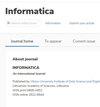Data Processing of Municipal Wastewater Recycling Based on Genetic Algorithm
IF 2.8
4区 计算机科学
Q2 COMPUTER SCIENCE, INFORMATION SYSTEMS
引用次数: 0
Abstract
In order to accurately process the data of urban sewage recycling, this paper designs an adaptive genetic algorithm, which integrates genetic algorithm, adaptive genetic algorithm and traditional PID respectively, and designs simulation experiments to compare their performance. The simulation results show that the self-adaptive PID control algorithm is superior to the genetic PID control algorithm in both control accuracy and dynamic characteristics. The PID controller with good optimization performance is applied to the control object of sewage treatment system. Through simulation analysis, the adaptive genetic algorithm only needs 52s when adjusting the step response simulation. The overshoot of the system is 8%. The interference in the simulation is restored to a stable state within the interference 18S, and the adjustment time in the robustness simulation is reduced by about 15s compared with the genetic algorithm. In conclusion, the adjustment time of the system is shortened, the overshoot of the system is reduced, and the anti-interference and robustness are enhanced. For the dissolved oxygen concentration of the key object in the control system, the above controller with good performance is applied to the sewage treatment control system, which not only reduces the overshoot and regulation time, but also improves the control accuracy, and can well meet the control requirements of sewage treatment.基于遗传算法的城市污水回用数据处理
为了准确处理城市污水回用数据,本文设计了一种自适应遗传算法,将遗传算法、自适应遗传算法和传统PID分别集成在一起,并设计了仿真实验来比较它们的性能。仿真结果表明,自适应PID控制算法在控制精度和动态特性方面都优于遗传PID控制算法。将具有良好优化性能的PID控制器应用于污水处理系统的控制对象。通过仿真分析,自适应遗传算法在调整阶跃响应仿真时只需要52s。系统超调量为8%。仿真中的干扰在干扰18S内恢复到稳定状态,鲁棒性仿真中的调整时间比遗传算法减少了约15s。综上所述,缩短了系统的调整时间,减小了系统的超调量,增强了系统的抗干扰性和鲁棒性。对于控制系统中关键对象的溶解氧浓度,将上述性能良好的控制器应用到污水处理控制系统中,不仅减少了超调时间和调节时间,而且提高了控制精度,能够很好地满足污水处理的控制要求。
本文章由计算机程序翻译,如有差异,请以英文原文为准。
求助全文
约1分钟内获得全文
求助全文
来源期刊

Informatica
工程技术-计算机:信息系统
CiteScore
5.90
自引率
6.90%
发文量
19
审稿时长
12 months
期刊介绍:
The quarterly journal Informatica provides an international forum for high-quality original research and publishes papers on mathematical simulation and optimization, recognition and control, programming theory and systems, automation systems and elements. Informatica provides a multidisciplinary forum for scientists and engineers involved in research and design including experts who implement and manage information systems applications.
 求助内容:
求助内容: 应助结果提醒方式:
应助结果提醒方式:


